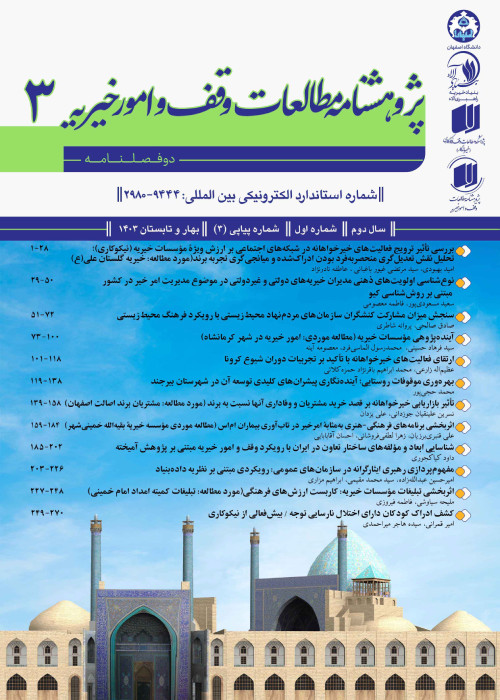Conceptualizing Self Sacrifical Leadership in Public Organizations: A Grounded Theory Approach
In recent decades, criticism of utilitarianism has emerged within various branches of the social sciences. Contrary to the assumption that these critiques align decisively with utilitarian principles, scholars have increasingly emphasized the importance of other-oriented values in their discourse. These values encompass collective morality, public interest, social responsibility, moral values, and concern for others, highlighting selflessness, cooperation, and the well-being of others. This shift in focus underscores the complex nature of ethical considerations within societal frameworks (Grant, 2007). Leadership, a central topic in management and organization studies, necessitates an understanding of human nature and behavior. While effective leadership entails guiding groups toward shared goals, it's acknowledged that leaders may misuse their power for personal gain (Maner & Mead, 2010). Recently, scholars have increasingly turned their attention to altruistic leadership and its potential impact within organizational contexts. Despite skepticism regarding the feasibility of self-sacrificial behavior in environments rife with moral dilemmas and self-interested agendas (Arnold & Loughlin, 2010), research suggests that organizations benefit from cultivating altruistic leadership styles. Such behaviors, though uncommon, foster positive perceptions of leaders, particularly during times of crisis, signaling a departure from authoritative leadership models (De Cremer & Van Knippenberg, 2005). The emergence of altruistic leadership reflects a broader trend in leadership studies, emphasizing service over dominance and prioritizing collective welfare over self-interest. This shift is evident in the exploration of concepts such as empowerment, followership, collaborative leadership, and ethical leadership. Altruism is increasingly recognized as a foundational element in these evolving perspectives on leadership, underscoring the importance of selflessness in contemporary leadership paradigms (Choi & Mai-Dalton, 1998).
The methodology used in this research is the grounded theory introduced by Barney Glaser and Anselm Strauss in the late 1960s. This methodology outlines a systematic approach to developing theories from data collected during social research. Unlike logical-deductive research, which evaluates existing theories, grounded theory involves deriving theories directly from collected data. This method emphasizes a continuous interaction between data collection and theory generation (Glaser, 2007). Grounded theory construction involves gathering data from various sources, such as interviews and behavioral observations, with in-depth interviews being the most commonly employed method. In this approach, data collection and analysis occur concurrently through the continuous comparison method. This means that interviews and data interpretation proceed simultaneously until theoretical saturation is attained. In this research, the interview is used as the tool to collect data, and a theoretical sampling method was employed to select individuals with rich information about the subject matter, capable of providing in-depth descriptions of their experiences. Specifically, the study involved interviewing 10 managers employed in the public sector.
In this research, social learning, purposefulness and experimentalism, essential values, and collective and common identity are the causal factors influencing the formation of the central phenomenon, that is, awareness and cognition. Crisis, type of task, organization's mission, and emotional atmosphere have been introduced as effective background factors in increasing the leader's awareness and recognition of selfless actions. Empathy is one of the intervening conditions, and positive self-concept has been identified as a strategy that is formed by the action and interaction of the central phenomenon that will eventually lead to consequences such as self-expression and social activism, resilience and endurance of hardships, and willingness to serve and perform duties.
According to the prevailing assumptions of utilitarianism and profit-seeking within the management and organizational behavior literature, it is commonly believed that leaders and managers primarily utilize organizational power and resources for their gain. It is thought that only through organizational monitoring and supervisory mechanisms are they compelled to consider utilitarian principles and prioritize collective and organizational interests (Ghoshal, 2005). However, recent research findings suggest avenues for fostering selfless behaviors within workplace environments. By identifying the determinants of self-sacrificial behaviors—including when and why these behaviors occur, as well as the obstacles to their manifestation—interventions can be designed to promote and cultivate such behaviors within organizations. The public organizations of the country, especially in the conditions of the resistance economy, need managers who selflessly adhere to the goals of the organization and sacrifice personal and group interests for national interests. Acquiring knowledge about the phenomenon of self-sacrifice helps to promote and strengthen such behaviors in the organization. In this research, a foundational data model of the actions and interactions of selfless leaders in the organization is presented.
- حق عضویت دریافتی صرف حمایت از نشریات عضو و نگهداری، تکمیل و توسعه مگیران میشود.
- پرداخت حق اشتراک و دانلود مقالات اجازه بازنشر آن در سایر رسانههای چاپی و دیجیتال را به کاربر نمیدهد.



